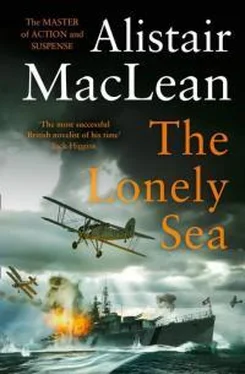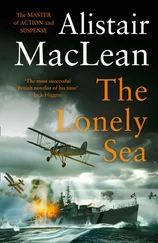No such thoughts as these, it is safe to assume, was in the mind of Captain Leach of the Prince of Wales as the smoke and the dust of the awesome explosion cleared away and the Hood was seen to be gone. The Prince of Wales was fighting for her life now, and her captain knew it. Both the Bismarck and the Prinz Eugen had swung their guns on him as soon as the Hood had blown up and already the deadly accuracy of their heavy and concentrated fire was beginning to have its effect. Captain Leach summed up the situation, made his assessments and didn’t hesitate. He ordered the wheel to be put hard over, broke off the engagement and retired under a heavy smokescreen.
‘The ship that ran away’. That was what the Prince of Wales was called then, the coward battleship that turned and fled: it is an open secret that ship, officers and men, during the remainder of the Prince of Wales’ s short life, were henceforward treated with aversion and cold contempt by the rest of the Navy and this opprobium ended only with the death of the ship and the gallant Captain Leach a bare seven months later under a savage Japanese aerial attack off the coast of Malaya. The opprobrium was more than unjust – it was grotesquely and bitterly unfair. Once again, the Admiralty must shoulder much of the blame.
In fairness, it was completely unintentional on their part. The trouble arose from their official communiqué on the action, which was no better and no worse than the typical wartime communiqué, in that it tended to exaggerate the damage sustained by the enemy while minimizing our own.
Two statements in the communiqué caused the grievous misunderstanding: ‘The Bismarck was at one time seen to be on fire’ and ‘The Prince of Wales sustained slight damage’. Why in all the world then, people asked, hadn’t the ship which had received only slight damage closed with the one on fire and destroyed it. What possible excuse for running away?
Excuse enough. The fire on the Bismarck, while demonstrable testimony to the occasional liveliness of official imaginations, had, in actual fact, consisted of no more than soot shaken loose from her funnel. As for the Prince of Wales ’s ‘slight damage’, she had been struck by no fewer than three 8-inch shells and four of the Bismarck ’s great 15-inch shells, one of which had completely wrecked the bridge, killing everyone there except Leach and his chief yeoman of signals. Furthermore, one of the Prince of Wales’ s big guns was completely out of action, repeated breakdowns in the others led to their firing intermittently or not at all and the jamming of ‘Y’ turret shell ring had put the four big guns of that turret – half of Captain Leach’s effective armament – out of commission. The Prince of Wales, far from being slightly damaged, was badly crippled: to close with her powerful enemy, to expose herself any longer to the murderous accuracy of these broadsides would have been no mere act of folly but quick and certain suicide.
The Bismarck made no attempt to pursue and engage her enemy. With the Hood destroyed and the Prince of Wales badly hurt and driven off in ignominious defeat, she had already achieved success beyond her wildest dreams. A magnificent victory, a tremendous boost to the prestige of the German Navy and, in Goebbels’ hands, a newforged propaganda weapon of incalculable power – why risk throwing it all away by exposing herself to a lucky salvo that might destroy her turrets or bridge or fire control directors – or might even sink her? Besides, her primary purpose in breaking into the Atlantic was not to engage the Home Fleet – that was the last thing Admiral Lutjens wanted – but to annihilate our convoys.
The rejoicing aboard the Bismarck was intense, but no more so than the jubilation in the chancellory of Berlin, where news of this resounding triumph had been flashed as soon as the Bismarck had broken off the action.
Within an hour the news would be in the hands of every newspaper and radio station in the country. By the afternoon every person in Germany – and by the evening every country in Europe – would know of the crushing defeat suffered by the Royal Navy. An overjoyed Hitler sent his own and the nation’s congratulations and admiration to the officers and men of the Bismarck, and personally announced, amongst numerous other decorations, the immediate award of the Knight’s Insignia of the Iron Cross to the Bismarck ’s first gunnery officer.
Only one man held aloof, only one man remained untouched by the exultation, the exhilaration of the victory – the man, one would have thought, who had the greatest cause of all to rejoice, Captain Lindemann, commanding officer of the Bismarck. Lindemann was unhappy and more than a little afraid – and no man had ever called Lindemann’s courage into question. A gallant and very experienced sailor, reckoned about the best and the most skilful in the German Navy – and he had to be, to have command of the finest ship in the German Navy – he was filled with foreboding, a dark certainty of ultimate defeat.
Although his ship had suffered no damage either to her guns or engines and was still the complete fighting machine, a shell, crashing through the heavy armour, and exploding in her fuel tanks had perceptibly reduced her speed and he feared he might not have sufficient fuel left for sustained high-speed steaming and manoeuvring – and Lindemann realized only too clearly that he would require all the speed and every pound of thrust the Bismarck ’s big turbines were capable of developing. He knew the British, he knew the tremendous regard and affection in which they had held the Hood, and he knew too that, far from being intimidated by the appalling manner of her death, they would have been goaded into a savage fury for revenge and would not rest until they had hunted them down and destroyed them.
These fears he tried to communicate to his senior officer, Admiral Lutjens, and suggested that they return immediately to Bergen, for repairs. Admiral Lutjens, for reasons which we will never know – possibly the elation of their great success had temporarily blurred his judgment and dreams of glory are notoriously treacherous counsellors – overruled his captain. They would go on as originally planned. So the Bismarck turned south-west and pushed on deep down into the Atlantic.
The Navy followed her. All afternoon and evening the Norfolk, Suffolk and Prince of Wales shadowed both German ships, sending out constant radio transmissions to Admiral Tovey, who swung his squadron on to a new interception course.
The Bismarck knew she was being followed, but seemed to be undisturbed by this. Only once, briefly, did she show her teeth. About 6.30 in the evening, she turned on her tracks in a fog bank and opened fired on the Suffolk, but broke off the engagement almost at once, when the Prince of Wales joined in. (It was not realized at the time that this was merely a diversion to let the Prinz Eugen break away to a German oiler, where she refuelled and made her way safely to Brest.)
The Bismarck now turned to the west and the British shadowers followed, Admiral Tovey’s squadron still pursuing. But Tovey’s King George V, Repulse and Victorious were now only three out of many ships converging on the German capital ship.
The battleship Revenge was ordered out from Halifax, Nova Scotia. Vice-Admiral Somerville’s Force H – the battle cruiser Renown, the now legendary Ark Royal and the cruiser Sheffield – were ordered up from Gibraltar. The battleship Ramillies, then with a mid-Atlantic convoy, the cruiser Edinburgh, down near the Azores and the cruiser London, with a convoy off the Spanish coast, were all ordered to intercept. Last, but most important of all, the battleship Rodney was pulled off a Statesbound convoy. The Rodney herself was going to Boston for an urgent and long overdue refit, as her engines and boiler-rooms were in a sorely dilapidated state: but the Rodney ’s great 16-inch guns, and the magnificently Nelsonian capacity of her commander, Captain Dalrymple-Hamilton, to turn a blind eye to what he considered well-meant but erring signals from the Admiralty were to prove more than counter-balance for the parlous state of her engines. The greatest hunt in naval history was on.
Читать дальше












